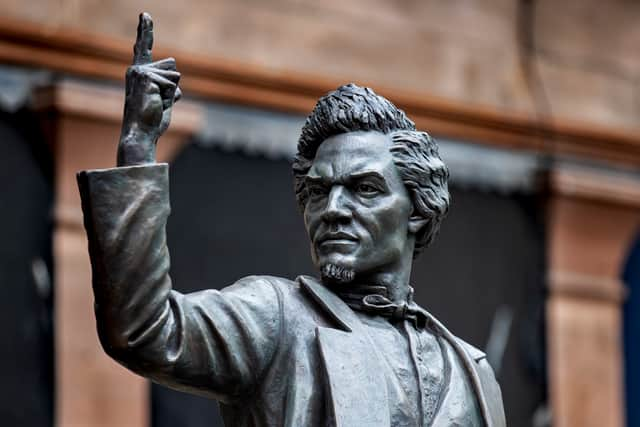Statue of anti-slavery activist Frederick Douglass erected in Belfast but why is it in Northern Ireland?
and live on Freeview channel 276
The first statue in Europe of famous anti-slavery campaigner Frederick Douglass has been erected in Belfast and stands “amongst the people he loved”.
Douglass was born into slavery but managed to escape in 1838 and went on to become a national leader of the abolitionist movement in America, known for his eloquent speeches and writings.
Advertisement
Hide AdAdvertisement
Hide AdHe first visited Belfast from the United States in 1845 at the invitation of the Belfast Anti-Slavery Society and returned for a second visit in 1846.
A statue of the former slave turned writer and statesman, is now on display in Lombard Street in the city centre.
Professor Christine Kinealy, the director of Ireland’s Great Hunger Institute at Quinnipiac University in Connecticut, is the author of Frederick Douglass and Ireland: In His Own Words.
At the unveiling of the statue Dr Kinealy said: “Frederick Douglass is increasingly a symbol of international social justice.”
Advertisement
Hide AdAdvertisement
Hide Ad

“This is something that’s very dear to many people within Belfast, so I hope this place becomes a rallying point for people who want to effect real change and to have a more inclusive, equitable future for all people of Ireland.”
Douglass gave around 50 speeches in his time in Ireland and could speak for up to two hours without notes.
Dr Kinealy said the statue was a homecoming for Douglass, who often expressed his love for the city.
She added: “I think the most beautiful is that when he was leaving Belfast, he said: ‘Wherever else I feel myself to be a stranger, I will always know I have a home in Belfast.’."
Advertisement
Hide AdAdvertisement
Hide AdSome 12 students from the US attended the unveiling as part of their work with the Frederick Douglass Global Fellowship, a programme that studies social justice leadership in America, South Africa, and Ireland.
Fellowship student Akil Cole, from Georgetown University, said he was “inspired” to see the statue of Douglass in Belfast.
“We’re able to remember them for their work… but I think more importantly, there are people that actually still care about his work, about social justice, about equity, about access to rights, not just in a historical sense, but in a very present sense,” he said.
The life-size statue was created by renowned Scottish figurative sculptors Alan Beattie Herriot and Hector Guest. It is located beside the historic First Presbyterian Church in Rosemary Street where he delivered lectures during his time in Belfast.
Advertisement
Hide AdAdvertisement
Hide AdBelfast Lord Mayor Councillor Ryan Murphy said: “I think it’s absolutely fantastic, it’s important that we tell the history of Belfast.”
“Frederick himself was the leader of the abolitionist movement, he was a former slave and he had to come to Britain and Ireland in fear of being captured again back in America, and during that time he noted the welcome that he received in these parts."
Tukura Makoni, policy officer from the African Caribbean Support Organisation Northern Ireland, said the statue would represent “many things to many people” but added that the African/Caribbean community were not engaged with the process of the statue being built.
“The way we can improve things for all communities here in Belfast is by including them in processes that dictate the things that are influential or significant in our lives, the basic things,” he said.
“Even when looking at the erection of this statue, the African and Caribbean community was not consulted, was not engaged about how we feel about the statue.”
Comment Guidelines
National World encourages reader discussion on our stories. User feedback, insights and back-and-forth exchanges add a rich layer of context to reporting. Please review our Community Guidelines before commenting.
